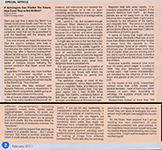If Astrologers Can Predict The Future, How Come They’re Not All Rich? |
 |
<<Click to see original |
Don’t you just love it when the World Cup comes round every fourth year? No no, not the sight of 22 men prancing around a field kicking a dirty bit of leather. I mean the peripheral news that can be guaranteed to grab the headlines with the whacky and entirely unpredictable.
This time around, we heard the news that Paul the psychic octopus, who lives in Germany's Oberhausen Sea Life aquarium, had become the centre of an international bidding war, after a Spanish businessmen offered 38,000 euros to bring him to Spain, following their World Cup success, while German newspapers had been running a series of Octopus recipes following the correct prediction that Spain would beat Germany.
Argentine TV viewers, too, were horrified when a commentator liquefied a live octopus on TV in revenge for Germany's soothsaying squid calling the correct results in the World Cup. "Your moment has arrived, little Nazi octopus" said Roberto Pettinato, a host on Argentina's 'A Perfect World' programme, before going on to blend the poor creature into a pulp.
We all love to dream about predicting the future. How many readers of this journal, for instance, will instinctively turn towards the horoscope section in a bid to learn something about their love lives, or whether riches beyond the dreams of average will be coming their way?
OK, I admit it. I do. But excellent though soothsayer Miam Medrano’s predictions invariably turn out to be, I guess I simply don't believe in this astrology stuff – perhaps because I'm a Cancer, and we're naturally sceptical. (Hmm, that joke is so old it might actually predate the invention of astrology!)
It might also be due to the fact that when working on a regional newspaper in the UK, one of my jobs was to cobble together a daily horoscope by dipping at random into a pool of ready-written sentences and stringing them together to form the required length. Oh, believe me, I had talent. Or so the clutch of letters every week from delighted readers would tell me.
The argument put forward by sceptics of this noble art would tell you that there are known to be two forces with which the heavens can influence us: gravity and electromagnetic force.
The electrical charge of most of the planets is negligible. Venus, Mars and Pluto have no magnetic fields, and Mercury has only 1/1000th of the Earth’s field. Only gas giant Jupiter has a field 20,000 times stronger than Earth’s, overtaking Saturn at 500 times stronger, Uranus at 50 times stronger, and Neptune at 30 times stronger.
Magnetic field falls away rapidly – it is inversely proportional to the square of the planet’s distance from Earth. So these planets are so far away from us that any influence their magnetic fields might have is countered by the influence of the Earth’s own magnetic field. The same is true of the effects of the gravity of the other planets: almost all the effects are less than 1 billionth of the effects of Earth’s gravity.
In terms of forces that might influence human beings, the Earth influences us a lot more than distant planets and other bodies in space have the capacity to. The electromagnetic force of an electric razor influences you 16 million times more than that of Jupiter when you are shaving and if you stand next to a typical truck, it exerts a gravitational influence 300 times more than that of Mars.
Extensive scientific research over more than 40 years, which began in London in 1958, has also debunked astrology's central claim - that human characteristics are moulded by the influence of the Sun, Moon and planets at the time of a person's birth.
In the course of the study, researchers tracked more than 2,000 people over several decades - most of them born within minutes of each other. According to astrology, the subjects should have had very similar traits.
Researchers looked at more than 100 different characteristics, including occupation, anxiety levels, marital status, aggressiveness, sociability, IQ levels and ability in art, sport, mathematics and reading - all of which astrologers claim can be gauged from birth charts. But the scientists failed to find any evidence of similarities between the "time twins”.
So it could well be argued that astrology is useless in a scientific sense. But I would maintain that there is another scenario in which it could actually prove to be extremely useful. If you go on any leadership or management training course, invariably it will involve a degree of ‘brainstorming’ in which participants will use triggers put forward by others to set their own minds wandering down paths they might not otherwise have considered and allowing them to look at a situation from all angles.
By this same argument, astrology won't predict the future, but it serves well as a tool for looking at things from different perspectives. That's also why the astrology predictions in magazines and the like are so broad: they can apply to everyone, but each person might still gain new insight into his own life.
So, Ms Miam. Rest assured that I will be reading the next instalment of your astrological prediction with great interest. In the meantime I must remind myself not to use my electric shaver whilst standing near a busy road junction. I might well be sceptical, but I’m not that stupid!
